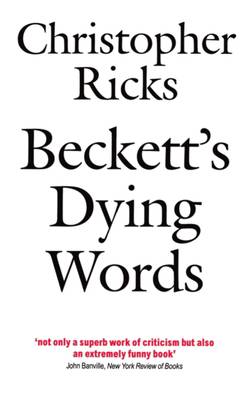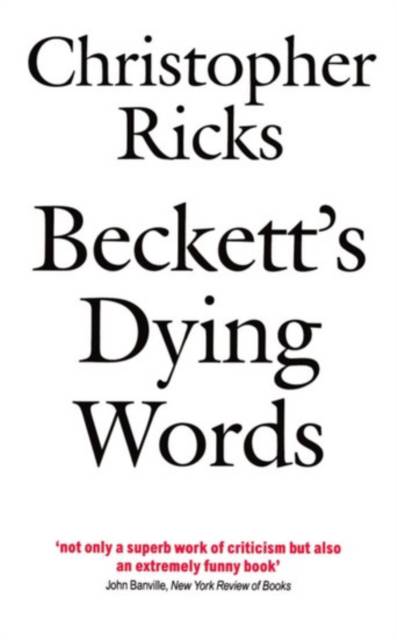
- Afhalen na 1 uur in een winkel met voorraad
- Gratis thuislevering in België vanaf € 30
- Ruim aanbod met 7 miljoen producten
- Afhalen na 1 uur in een winkel met voorraad
- Gratis thuislevering in België vanaf € 30
- Ruim aanbod met 7 miljoen producten
Zoeken
Omschrijving
Most people want to live forever. But there is another truth: the longing for oblivion. With pain, wit, and humor, the art of Samuel Beckett variously embodies this truth, this ancient enduring belief that it is better to be dead than alive, best of all never to have been born. Beckett is the supreme writer of an age which has created new possibilities and impossibilities even in the matter of death and its definition--an age of transplants and life-support.
But how does a writer give life to dismay at life itself, to the not unwelcome encroachments of death, when it is for the life, the vitality of their language that we value writers? Beckett became himself as a writer when he realized in his very words a principle of death: in clichés, which are dead but won't lie down; in a dead language and its memento mori; in words which mean their own opposites, like cleaving; and in what Beckett called a syntax of weakness.
This artful study explores the relation between deep convictions about life or death and the incarnations which these take in the exact turns of a great writer, the realizations of an Irishman who wrote in English and in French, two languages with different apprehensions of life and of death.
But how does a writer give life to dismay at life itself, to the not unwelcome encroachments of death, when it is for the life, the vitality of their language that we value writers? Beckett became himself as a writer when he realized in his very words a principle of death: in clichés, which are dead but won't lie down; in a dead language and its memento mori; in words which mean their own opposites, like cleaving; and in what Beckett called a syntax of weakness.
This artful study explores the relation between deep convictions about life or death and the incarnations which these take in the exact turns of a great writer, the realizations of an Irishman who wrote in English and in French, two languages with different apprehensions of life and of death.
Specificaties
Betrokkenen
- Auteur(s):
- Uitgeverij:
Inhoud
- Aantal bladzijden:
- 224
- Taal:
- Engels
- Reeks:
Eigenschappen
- Productcode (EAN):
- 9780192824073
- Verschijningsdatum:
- 23/03/1995
- Uitvoering:
- Paperback
- Formaat:
- Trade paperback (VS)
- Afmetingen:
- 126 mm x 204 mm
- Gewicht:
- 249 g

Alleen bij Standaard Boekhandel
+ 128 punten op je klantenkaart van Standaard Boekhandel
Beoordelingen
We publiceren alleen reviews die voldoen aan de voorwaarden voor reviews. Bekijk onze voorwaarden voor reviews.











